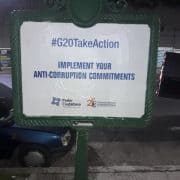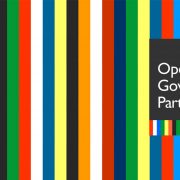|
Getting your Trinity Audio player ready...
|
The role of civil society in democracy and good governance is becoming increasingly important. Acting as the voice of the people, civil society holds governments to account for enforcing the rule of law, complying with legislation and policy, and implementing promises made.
When the Group of Twenty (G20), of which South Africa is a member, met in Buenos Aires on 30 November for its annual summit, one of the issues put forward to the group – publicly in a series of street posters – was its failure to stick to the anti-corruption commitments it has been making for years, and done scarcely anything about.
Transparency International (TI) and its Argentinian chapter Poder Ciudadano put posters up in the streets of Buenos Aires, bearing the slogan “#G20TakeAction: Implement Your Anti-Corruption Commitments”. The message could hardly be missed, as several commentators noted, but would the G20 deliberately ignore it?
“G20 leaders seem to have been too busy arguing among themselves to pay attention to their own anti-corruption policy recommendations, which we’ve been reminding them of through the official engagement channels,” said Maria Emilia Berazategui of Poder Ciudadano. “So we decided to put the message somewhere they can’t miss it – on the avenue leading to the summit venue.”
As International Advisory Committee member for the Civil 20 (C20), chair of the C20 anti-corruption working group and a concept partner of the Business 20 (B20), TI and Poder Ciudadano asked the G20 to actually implement a range of anti-corruption commitments made over the years.
The C20 and B20 are two of seven engagement groups of the G20. They represent the interests of citizens and advocacy groups, and the private sector respectively, in urging world leaders to act on behalf of the people they serve, and not just in the best interests of politicians and special interest groups.
Civil society and business disappointed with G20
In August the C20 met in Argentina for its annual summit, with the ultimate aim of amplifying the voice of civil society to ensure G20 leaders make good on their promises. Afterwards, in a rare show of solidarity, the B20 and C20 released two historic joint statements highlighting the crucial role of anti-corruption in maintaining economic and financial stability.
The first statement urges G20 countries to create specific anti-corruption action plans to help combat cross-border corruption and build accountability; the second statement calls for increased integrity and transparency in state-owned enterprises, which are essential to national economic success.
With the business community and civil society speaking with one voice against corruption, it still remains to be seen whether G20 leaders will live up to their promises.
The G20 has previously adopted anti-corruption commitments regarding the publication of asset declarations for public officials, increased transparency in public procurement, and requirements for companies to disclose their ultimate owners. In April 2018, a TI report found that most G20 countries were failing to implement the group’s own principles on ending the anonymous company ownership that fuels corruption.
Through the C20, TI and Poder Ciudadano have also recommended that the G20 tackle the revolving doors between public and private sectors, and improve the accountability and transparency of state-owned enterprises.
Pablo Secchi, executive director of Poder Ciudadano, stated: “Despite repeated statements that corruption is a priority and the development of more than 60 anti-corruption resources, too often combatting corruption remains an afterthought in G20 leaders’ decisions and actions. We believe that enough commitments have been made, and now is time to put them into practice.”
Delia Ferreira Rubio, Chair of Transparency International, said: “Several of the world leaders gathering in Buenos Aires this week are clamping down on the freedom of the media, civil society and the independence of the judiciary in their countries, or openly threatening to do so. This shows that they aren’t serious about tackling corruption, even if they claim to be cleaning up their countries. This summit under Argentina’s presidency could be an opportunity to do something about corruption and actually follow through on their commitments. But will we see any action?”
Time to walk the talk, G20
In the joint statement issued at the end of the conference, the G20 said: “We remain committed to prevent and fight corruption and lead by example. We agree on the new action plan 2019-2021 and endorse Principles on Preventing Corruption and Ensuring Integrity in State-Owned Enterprises and on Preventing and Managing Conflicts of Interest in the Public Sector. These will foster transparency and integrity in the public and private sectors.
“We will continue practical cooperation to fight corruption including in line with our G20 commitments. We will further explore the links between corruption and other economic crimes and ways to tackle them, including through cooperation on the return of persons sought for such offences and stolen assets, consistent with international obligations and domestic legal systems. We ask relevant international organizations to report back to us on those issues during the next presidency.
“We call for the effective implementation by all G20 countries of the UN Convention Against Corruption, including the criminalization of the bribery of foreign public officials, and note the work towards possible adherence to the OECD Convention on Combating Bribery of Foreign Public Officials in International Business Transactions.”
However, TI was not impressed. “We are tired of empty promises. Implement your anti-corruption commitments now!” the organisation tweeted. “Speeches and documents are not enough! Genuine action is what the world needs to fight corruption.”








